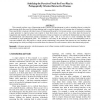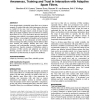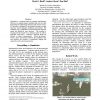75 search results - page 5 / 15 » Computational Influence for Training and Entertainment |
CA
2003
IEEE
14 years 4 months ago
2003
IEEE
This research explores ways of harnessing people’s passion for entertainment in order to stimulate players to attain the meta-learning skills they need for lifelong learning and...
CHI
2009
ACM
14 years 5 months ago
2009
ACM
Even though adaptive (trainable) spam filters are a common example of systems that make (semi-)autonomous decisions on behalf of the user, trust in these filters has been underexp...
SIGUCCS
1998
ACM
14 years 3 months ago
1998
ACM
This presentation will be a discussion of two Information Technology training programs at the university/college level. The two programs are ”The Student Peer Trainers”(SPT) a...
AIIDE
2006
14 years 5 days ago
2006
Simulation is a common feature in computer entertainment. However, in computer games simulation and story are often kept distinct by interleaving interactive play and cut scenes. ...
BMCBI
2006
13 years 10 months ago
2006
Background: Particle Swarm Optimization (PSO) is an established method for parameter optimization. It represents a population-based adaptive optimization technique that is influen...




